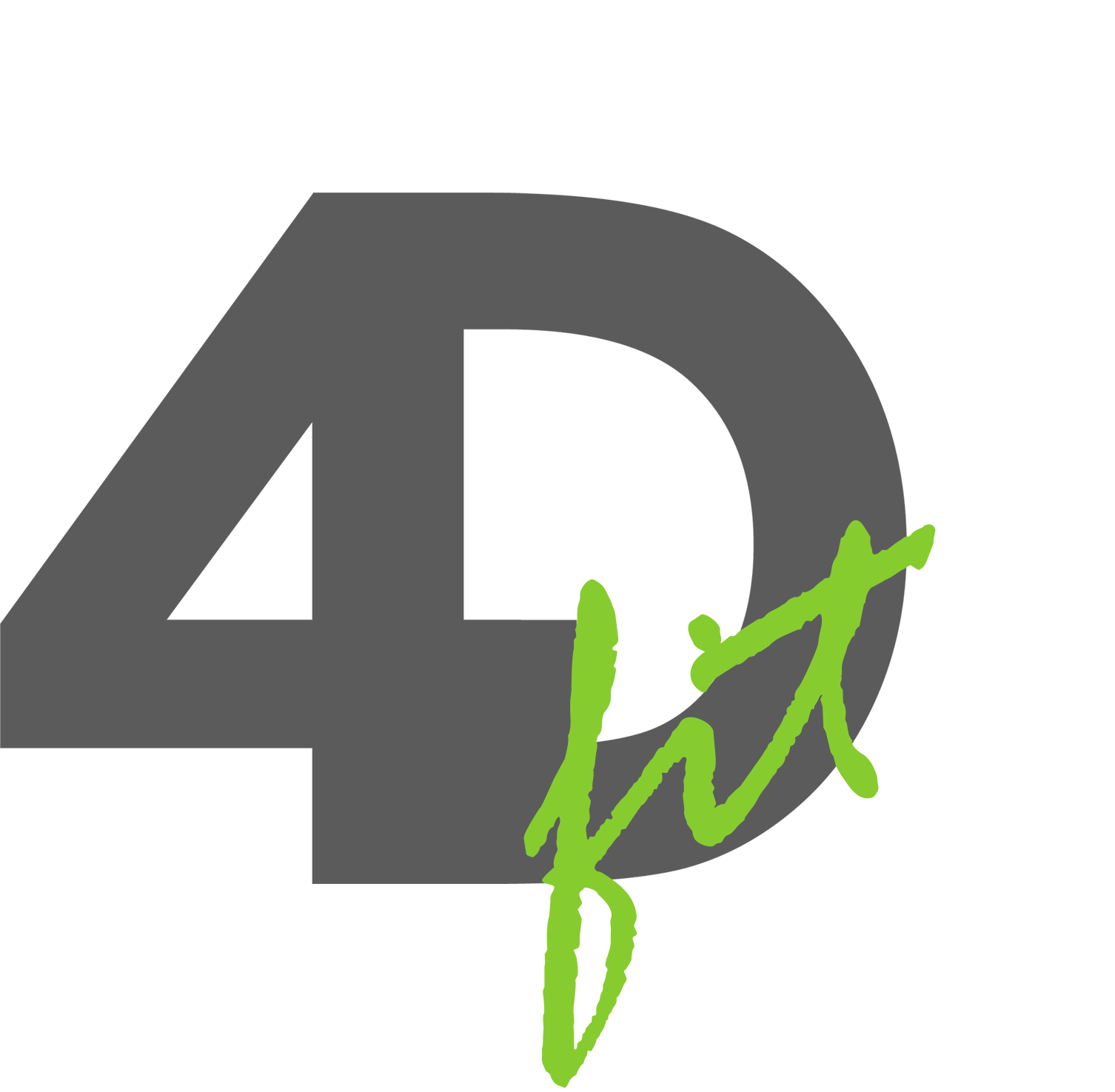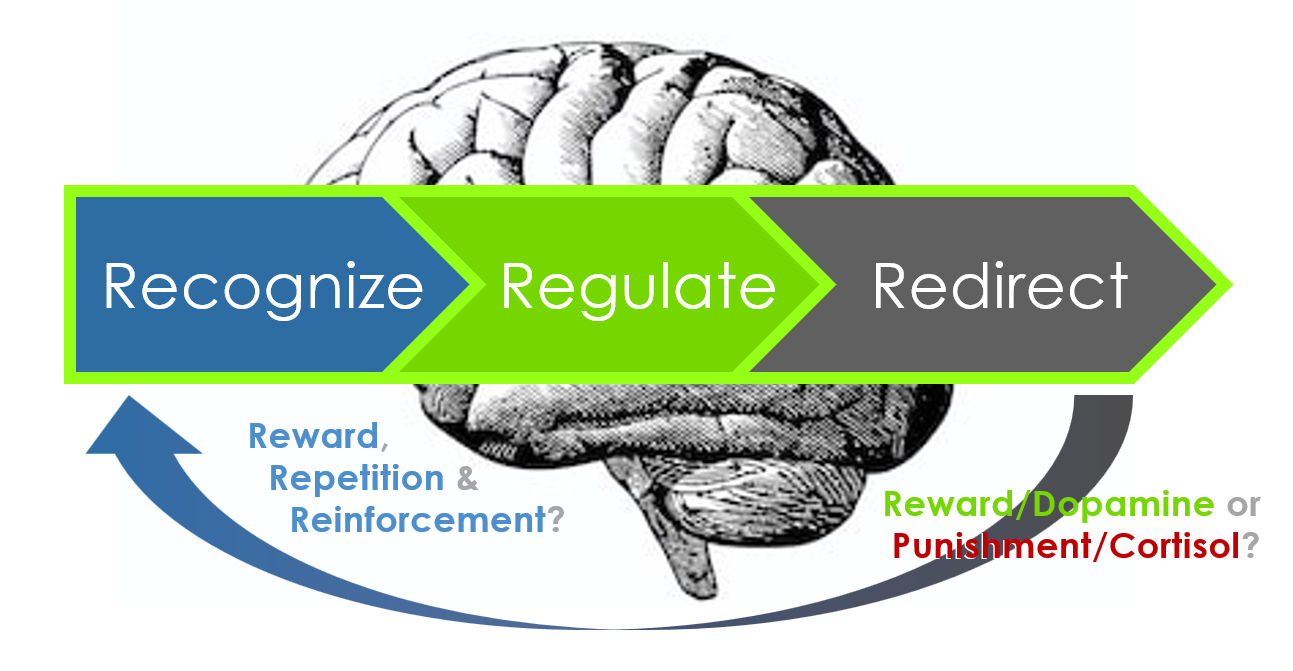Use the 4 R's to optimize mental function
When it comes to optimizing mental health, fitness, and function, the most important thing to know is how to regulate your nervous system based on what YOU need to optimize outcomes, including performance, achievement, and well-being.
Before you can regulate, however, you must first be aware of the neurological state you are in — including your mindset and emotions — to determine the best practice or support you need in the moment.
[PLEASE BE AWARE that mental fitness practices are NOT A REPLACEMENT for clinical or crisis care. If ever your life, health, or safety (or that of another) are at risk, please be sure to seek immediate medical or emergency assistance by calling 9-1-1 or the new mental crisis line at 9-8-8 or go directly to your nearest Emergency Room.]
The 4 R’s of Mental Fitness
As I describe in my book ‘MY BRAIN CAN’T POOP: A mental fitness guide for humans’, the 4D Fit Mental Fitness Model℠ provides a science-based framework with incremental practices based on the fitness concepts of Balance, Flexibility, Rest & Recovery, and Strength & Endurance as they relate to key factors of brain health, mental function, and neurodiversity.
To make it easier, you can use the 4 R’s of Mental Fitness (Recognize, Regulate, Redirect, Reinforce) to take the steps YOU need to optimize your nervous system and mental function:
RECOGNIZE - Before you can achieve a state of balance, you must first recognize when you feel unbalanced or dysregulated. Neurologically speaking, this is most often experienced and identified as a mental or emotional state. Recognizing our neurological state in the moment can be the hardest part, especially when we’re not taught or told how our brain or nervous system work — how our unconscious nervous system is running most of the show that makes it harder to engage our higher-functioning mind (i.e., prefrontal cortex) when our nervous system is dysregulated.
This is why it’s SO IMPORTANT to understand the basics of how your brain and nervous system work, to reduce the added stress and pressure that come from misunderstanding, shame, blame, stigma, and confusion (that only make regulating your nervous system that much HARDER).
So what does it feel like when you’re dysregulated?
The short answer is that a dysregulated nervous system can be experienced differently in different people.
Maybe you feel bad, sad, angry, excited, nervous, or confused. Maybe you’re having a hard time staying focused or feel like your head is spinning. Maybe you’re feeling depressed, anxious, or experiencing a panic attack. Maybe you lash out or withdraw inward. Maybe you have muscle aches and pains or a stress headache.
Whatever you’re feeling, it’s important to recognize the signs and signals to recognize when, what, and how you feel in moments of dysregulation to find the healthful practices and support you need to relieve stress, worry, and tension, to rebalance and regulate your nervous system to optimize mental function, focus, and well-being.
REGULATE - The BONUS is that recognizing your mental and emotional state with a greater sense of awareness, understanding, and acceptance can be a regulating practice in itself.
Once you recognize the need to regulate your nervous system, you have already achieved a more balanced state of mind to identify the regulatory practices you need to optimize your mental function (that might also require another R — Research):
Maybe you need a drink of water or a healthful snack to regulate your neurochemistry.
Maybe you need a breathing exercise to help oxygenate your blood and lower your heart rate.
Maybe you need to talk to someone or ask for help to reduce worry and stress and stimulate healthful neurochemicals like oxytocin and dopamine that help regulate your nervous system.
Maybe you believe in a higher power and use prayer to similarly reduce worry and stress and stimulate those healthful neurochemicals.
Maybe you take a moment to journal, meditate, or practice gratitude that can do the same.
Maybe you put on some calming or motivating music to stimulate and regulate your nervous system with sound and rhythm.
Maybe you use pleasing fragrances or aromatherapy to help stimulate your olfactory senses directly connected to your unconscious nervous system.
Maybe you move your body or take a walk outside to increase blood flow and endorphins that help regulate your nervous system as well.
Or maybe you practice something else that you find works well for you!
Remember that mental fitness practices are never one-size-fits-all and ultimately depend on what YOUR nervous system needs to regulate. Maybe one or more (or another) works best for you. If one doesn’t work, try another! The most important part is finding the practices that work best for YOU to help regulate your nervous system in the moment, that begins with awareness, acceptance, and understanding.
REDIRECT - Once your nervous system is more balanced and regulated, the next important step is to redirect your neurological energy in a more healthful and balanced way (that can be a challenge in itself, just like stretching a muscle — so go easy on yourself!):
Maybe you redirect your attention on a hobby or activity you enjoy.
Maybe you redirect your energy to apologize or forgive (that requires conscious energy and intention in itself).
Maybe you redirect by taking a break or vacation, whether you need some time alone or with family and friends (whatever is most healthful for you).
Maybe you take some time to reflect on what you’ve learned, how far you’ve come, and what you have in this moment.
By redirecting your thoughts, feelings, attention, and behaviors in a more mindful way, you are strengthening the neuropathways in your prefrontal cortex that powers emotional regulation, impulse control, and other important mental functions like creativity, empathy, and problem solving.
However you redirect your conscious attention and intention, you are forging the neuropathways you need to develop and maintain healthful thought, feelings, habits, and behaviors.
REINFORCE - Whether your aim is mental fitness or physical fitness, neurological reinforcement is a critical piece of maintaining healthful thoughts, feelings, habits, and behaviors. Without proper reinforcement (that includes rest, recovery, reward, and repetition), the new healthful neuropathways won’t forge strong enough to withstand the power of those older established neuropathways that continue to operate without any conscious energy or effort.
This is WHY doing the healthful thing can be SO HARD. Even when we consciously know better, it’s still our unconscious nervous system that’s running the show. The best we can do is practice recognizing, regulating, and redirecting the flow of our nervous system with conscious effort (that requires adequate energy).
Without proper and effective rest, recovery, reward, repetition, and reinforcement, maintaining healthful thoughts, feelings, habits, and behaviors can be incredibly difficult. This is why developing healthful habits can be so stressful and exhausting, due to the amount of conscious energy required to continuously recognize, regulate, and redirect your incredibly powerful unconscious nervous system.
For example, you might consciously KNOW veggies are healthier for you than candy, but candy just tastes SO GOOD (thanks to how it stimulates the unconscious nervous system)! It might be easier to choose the more healthful option when we're well-rested, well-fed, and less stressed but can be much harder to resist the temptation of a quick fix when we're tired, hungry, and stressed.
The sooner you get started, the better!
What makes maintaining healthful thoughts, feelings, habits, behaviors, and outcomes much EASIER is when they become forged into your unconscious nervous system through intrinsic or emotional reward (just think of the things you do easily and why you enjoy them?). This is why it’s so important to form healthful thoughts, feelings, and behaviors as early in life as possible, when they require less energy and effort to develop.
That said, it’s NEVER TOO LATE to forge new neuropathways with the 4 R’s!
Remember, just as physical fitness exercises help strengthen your muscles with proper practice and preparation, mental fitness exercises also work best when you’re fully rested, recovered, nourished, supported, and energized.
Discover what YOU need to optimize your mental fitness by completing your FREE Mental Fitness Assessment.

